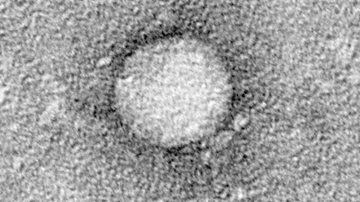The first ever DZIF prize goes to a hepatitis researcher
(26/11/2014) Virologist Stephan Urban from the University of Heidelberg will receive the DZIF Prize for Translational Infection Research, worth 5000 Euros. It will be awarded for the first time at the Annual Meeting of the German Center for Infection Research (DZIF) in Braunschweig.
The promising virus blocker is called Myrcludex B, and in future it could help many people suffering from chronic hepatitis B or D who consequently run the risk of developing liver cirrhosis and liver cancer. Professor Stephan Urban, virologist at the University of Heidelberg and hepatitis researcher at the DZIF, discovered the virus blocker and developed it further. Under the name Myrcludex B, the active substance has already been tested for tolerability, and will now also be investigated for safety and efficacy in clinical trials. For his achievement, Urban is being awarded the DZIF prize for top-class translational infection research.
The DZIF’s highest mission is translation: Drugs and therapies should be brought from basic research to the patient as quickly and systematically as possible. At the current Annual Meeting from 26th to 28th November, over 300 researchers are coming together to discuss research projects at the DZIF. The development of Myrcludex B exemplifies how translational processes can succeed when experts from basic research and clinicians work more closely together.
A prizeworthy development: Myrcludex B
Around 350 million people suffer from chronic hepatitis B infections and 25 million people suffer from hepatitis D infections, the most severe viral liver disease. In only a few cases, approved therapies for hepatitis B result in a cure of the disease, and there is currently no specific treatment at all for hepatitis D. New therapeutic strategies are therefore highly valuable.
In the last years, Professor Stephan Urban’s research team in Heidelberg has been developing a novel active substance which very efficiently blocks the entry of the two viruses into cells, in both cell cultures as well as mouse models. The mechanism of action, deciphered by the researchers, is easily explained. The peptide, a protein fragment from the virus envelope, binds specifically to liver cell sites where it inhibits molecular docking of the dreaded virus. It fits exactly into these sites, like a key into a lock, and remains there blocking the site for the active viruses. The receptor to which the virus binds is a bile salt transporter. The virus misuses this as an entry channel. Owing to these features, Myrcludex B can very efficiently protect hepatocytes, the virus’s target cells, from infection. This can be used as a preventive measure and also therapeutically, to reduce the number of infected cells in chronic infections. After having developed Myrcludex B for several years, the first clinical phase I trial (24 trial subjects) was successfully completed without any substance related side effects. This important first step in translating the substance to a possible later use in humans was supported by the DZIF, among others, and was conducted in Heidelberg.
Phase IIa trials are now underway, after the phase I trials for tolerability showed positive results. The interim results already show that the substance is safe and has antiviral effects in hepatitis B and D infections. A significant obstacle for a rapid further development has thus been overcome.
The prize winner
Stephan Urban won the National Youth Science Competition “Jugend forscht”, which encouraged him to begin his studies in chemistry and biochemistry, and he completed his degree at the University of Tübingen in 1991. After his PhD thesis in 1995 at the Max Planck Institute in Martinsried near Munich, he changed to the Center for Molecular Biology at the University of Heidelberg where he qualified to assume professorship in the year 2000. To this day, he heads an independent research group there, at the Department of Infectious Diseases, Molecular Virology. He has been the holder of the first DZIF professorship for “Translational Virology” in Heidelberg since 1 April.
Further information on the prize winner and the story of Myrcludex B can be found on our website.




